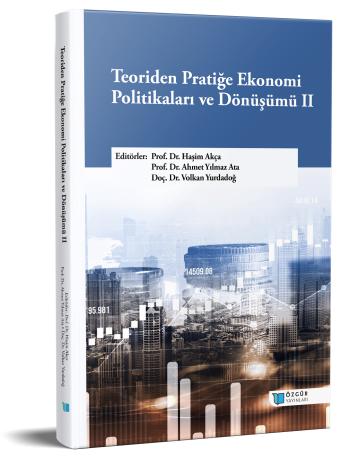
Kamu Harcamaları ve Enflasyon İlişkisi: G7 Ülkeleri İçin Panel Eşik Değer Analizi
Şu kitabın bölümü:
Akça,
H.
&
Ata,
A.
Y.
&
Yurdadoğ,
V.
(eds.)
2023.
Teoriden Pratiğe Ekonomi Politikaları ve Dönüşümü II.
Özet
Enflasyon özellikle gelişmekte olan ekonomilerde en sık görülen makroekonomik sorunlardan biridir. Ancak, son dönemde Covid-19 pandemisi ve buna bağlı kapanmalar, tedarik zincirindeki problemler, Rusya Ukrayna savaşı gibi uluslararası gelişmeler dolayısıyla uygulanan genişletici para ve maliye politikaları nedeniyle tüm dünyada son yarım yüzyılın en yüksek enflasyon oranları yaşanmaktadır. Bu durum hem akademisyenlerin hem de politika yapıcıların dikkatini çekmiş, ancak yapılan çalışmalarda iki değişken arasındaki ilişki henüz açıklığa kavuşmamıştır. Ayrıca, yapılan çalışmalarda kamu harcamalarının enflasyon üzerindeki etkisinin doğrusal olmayabileceği olasılığı da genellikle ihmal edilmiştir. Bu nedenle çalışmada, literatürdeki bu açıklıklar dikkate alınarak Hansen (1999) panel eşik değer yöntemi kullanılarak G7 ülkelerinde kamu harcamaları ile enflasyon arasındaki ilişkinin araştırılması amaçlanmıştır. Ampirik sonuçlar, G7 ülkelerinde kamu harcamaları ile enflasyon arasındaki ilişkinin doğrusal olmadığını göstermekte ve kamu harcamaları için bir eşik değer bulunduğuna dair güçlü kanıtlar sunmaktadır. Bu sonuç, kamu harcamalarının enflasyon üzerindeki etkisinin eşik değere bağlı olarak değişebileceğini göstermektedir. Buna göre, G7 ülkelerinde eşik değerin (1.344) altında bir kamu harcaması artışı enflasyonu pozitif, eşik değerin üstünde bir kamu harcaması artışı ise enflasyonu negatif etkilemektedir. Ayrıca panel nedensellik sonuçları, incelenen ülke grubunda kamu harcamaları ve enflasyon arasında bir geri besleme bağlantısının olduğunu göstermektedir. Bu sonuçlar, G7 ülkelerinde fiyat istikrarının sağlanmasında politika yapıcılara, para politikası araçları ile koordineli bir şekilde kamu harcamalarını da kullanabileceklerini işaret etmektedir.

